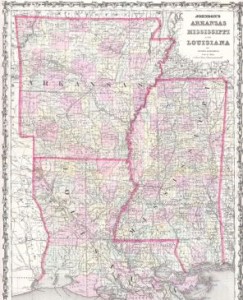 As spring hovers on the horizon, this week the Union begins an offensive expedition up the Red River and targeted at Shreveport, Louisiana, the headquarters of Confederate Gen. E. Kirby Smith’s Trans-Mississippi Department. Union Army Maj. General Nathaniel P. Banks and Union Navy Rear Admiral David D. Porter jointly command the combined force.
As spring hovers on the horizon, this week the Union begins an offensive expedition up the Red River and targeted at Shreveport, Louisiana, the headquarters of Confederate Gen. E. Kirby Smith’s Trans-Mississippi Department. Union Army Maj. General Nathaniel P. Banks and Union Navy Rear Admiral David D. Porter jointly command the combined force.
The federals face little resistance along the river until they arrive at Fort DeRussy, a heavily-manned fortification constructed of earth and partially plated in iron. The structure is designed to deflect the firepower of Union ironclads.
Proceeding cautiously in approaching the fort, utilizing disembarked troops as well as naval firepower, Union forces today attack the fort considered by some to be impregnable. Some 350 Confederate defenders manning the fort strive to repulse the federals, but to little effect. Within twenty minutes, Union soldiers scale the fort and the Confederates surrender.
With Fort DeRussy conquered, the Red River is now open to Alexandria, creating a new opportunity for the United States to expand its military footprint in Louisiana, while providing the Confederacy with yet another reason to worry about the future.
Meanwhile, this week editor J. D. Hufham of the North Carolina Baptist Biblical Recorder has other concerns in mind as he laments his paper’s drop in circulation among Confederate soldiers. Since last summer notable revivals have been taking place on the North Carolina home front and among the South’s brave defenders. Why have home front Baptists this year provided less funding to send the newspaper to the state’s soldier regiments?
During the past year we received liberal contributions from every part of the State to send the Recorder to the soldiers and a large number of copies was distributed among them.
We were thus enabled to furnish them reading matter of a varied, interesting and, we trust, profitable character. Recently, however, contributions for this purpose have fallen off considerably and, with them the copies of the Recorder for the army. We regret this, because we are constantly receiving applications for the paper from soldiers, officers and chaplains. Of course we can not grant all these requests. The friends of the soldiers must aid in this matter; and we are sure they could not make a more acceptable offering. It is the universal testimony of colporters, chaplains and all who are qualified to speak on this subject, that while soldiers gladly receive tracts & c., they accept and peruse religious newspapers with special interest. We are sure that we need not make any appeal to our readers on this subject. It is surely enough to know that money is needed for such an object.
The reason for the decline is unanswered, but perhaps is to be found in a combination of increasing home front inflation and poverty as well as a growing concern that the war is becoming a lost cause.
Sources: Battle of “Fort DeRussy,” National Park Service (link); “The Recorder and the Army,” Biblical Recorder, March 12, 1864 (link)


